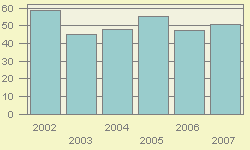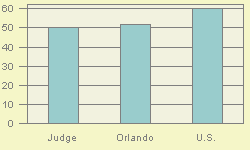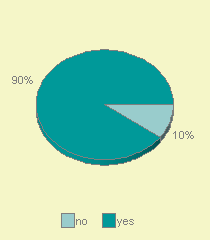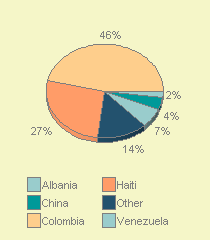Judge Rafael B. Ortiz-Segura
FY 2002 - 2007, Orlando Immigration Court
Judge Ortiz-Segura was appointed as an Immigration Judge in January 1994. Prior to his appointment in Orlando in May 1997, he was an Immigration Judge in San Juan, Puerto Rico. Judge Ortiz-Segura received a Bachelor of Arts degree in 1976, and a Juris Doctorate in 1979, both from the University of Puerto Rico. From 1988 to 1994, he worked as a general attorney for the former Immigration and Naturalization Service in San Juan, Puerto Rico. Judge Ortiz- Segura is a member of the Puerto Rico Bar.
Deciding Asylum Cases
Detailed data on Judge Ortiz-Segura decisions were examined for the period covering fiscal years 2002 through 2007. During this period, Judge Ortiz-Segura is recorded as deciding 2481 asylum claims on their merits. Of these, he granted 1229, gave 3 conditional grants, and denied 1249. Converted to percentage terms, Ortiz-Segura denied 50.3 percent and granted (including conditional grants) 49.7 percent. Figure 1 provides a comparison of Judge Ortiz-Segura's denial rate fiscal year-by-year over this recent period.
Nationwide Comparisons
Compared to Judge Ortiz-Segura's denial rate of 50.3 percent, nationally during this same period, immigration court judges denied 59.8 percent of asylum claims. In the Orlando Immigration Court where Judge Ortiz-Segura was based, judges there denied asylum 51.7 percent of the time. See Figure 2.
Judge Ortiz-Segura can also be ranked compared to each of the 267 individual immigration judges serving during this period who rendered at least one hundred decisions in a city's immigration court. If judges were ranked from 1 to 267 - where 1 represented the highest denial percent and 267 represented the lowest - Judge Ortiz-Segura here receives a rank of 204. That is 203 judges denied asylum at higher rates, and 63 denied asylum at the same rate or less often. Ranks are tallied separately for each immigration court. Should a judge serve on more than one court during this period, separate ranks would be assigned in any court that the judge rendered at least 100 asylum decisions in.
Why Do Denial Rates Vary Among Judges?
Denial rates reflect in part the differing composition of cases assigned to different immigration judges. For example, being represented in court and the nationality of the asylum seeker appear to often impact decision outcome. Decisions also appear to reflect in part the personal perspective that the judge brings to the bench.
Representation
If an asylum seeker is not represented by an attorney, almost all (86%) of them are denied asylum. In contrast, a significantly higher proportion of represented asylum seekers are successful. In the case of Judge Ortiz-Segura, 9.8% were not represented by an attorney. See Figure 3. For the nation as a whole, about 7.7% of asylum seekers are not represented.
Nationality
Asylum seekers are a diverse group. Over one hundred different nationalities had at least one hundred individuals claiming asylum decided during this period. As might be expected, immigration courts located in different parts of the country tend to have proportionately larger shares from some countries than from others. And, given the required legal grounds for a successful asylum claim, asylum seekers from some nations tend to be more successful than others.
For Judge Ortiz-Segura, the largest group of asylum seekers appearing before him came from Colombia. Individuals from this nation made up 46.5 % of his caseload. Other nationalities in descending order of frequency appearing before Judge Ortiz-Segura were: Haiti (26.7 %), Venezuela (6.9%), China (4.2%), Albania (2.3%). See Figure 4.
In the nation as a whole during this same period, major nationalities of asylum seekers, in descending order of frequency, were China (21.3%), Colombia (10.5%), Haiti (9.8%), Indonesia (4.0%), Albania (3.7%), Guatemala (3.3%), India (3.3%), El Salvador (2.7%), Armenia (2.0%), Ethiopia (1.6%), Mexico (1.6%), Russia (1.5%), and Venezuela (1.5%).




